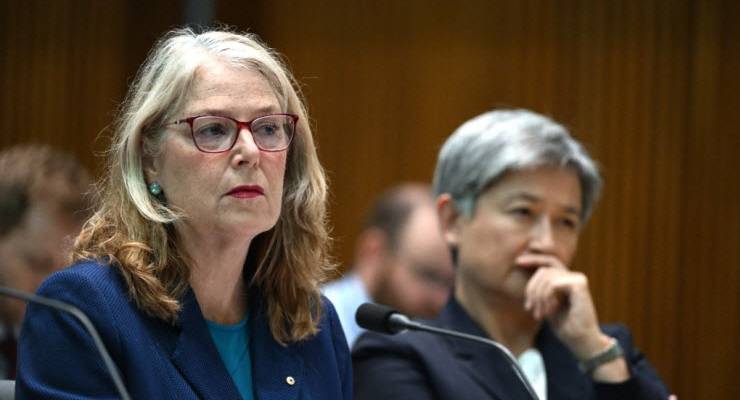
Australia’s barley trade with China is scheduled to be renewed, with working-level trade discussions having resumed. But we should caution against expecting a return to the status quo ante. So what can we expect from the thawing ties?
Last week, DFAT secretary Jan Adams met with Ma Zhaoxu, executive vice minister of foreign affairs in the People’s Republic of China.
These talks happened while China was conducting some of the most aggressive war games around Taiwan’s shores in living memory. The two events point to the tension between worsening security and improving economic affairs.
What should we make of this and how to reconcile the two?
First, what’s clear is that the trade sanctions didn’t work. Australian trade with China increased despite the $20 billion worth of trade sanctions. While Australian industries had to work hard to diversify and find other markets, they managed to rise to the occasion. In the end, there was some pain, particularly for the wine and lobster industries, but the biggest effect was felt in China where, through the northern winter, Chinese cities had to go without, adjusting to the shortfall from an absence of Australian fossil fuels.
Now, with reports suggesting China might lose in its dispute with Australia before the WTO, a concession is offered. A sensible and clever move by China designed, it appears, to elicit an enthusiastic response from Australia. In welcoming the breakthrough, we should be sober-minded about the stakes.
China does not trade with Australia because it likes its liberal Western democracy. It has only ever done so because it was a good deal. Once that no longer applies, it will look elsewhere and is already seeking to do so. Largely because of the quality, reliability and price of Australian-sourced materials, that is likely quite some time off.
While President Xi Jinping might have a sentimental attachment to the model of a Maoist command economy, where levers pulled in Beijing extract results far and wide, the global economy is not so easily controlled.
Xi evidently sees himself presiding over an economy in which he has the absolute say, but in the global marketplace, those levers work differently: there are bear and bull markets, floods and droughts, feasts and famines, human-made disasters and other environmental catastrophes, and fashion trends that ebb and flow. All of which affect the supply and demand of essential and luxury goods. This can’t be controlled by Beijing.
In choosing not to buy barley from Australia, the dynamic equilibrium of the global marketplace meant that other markets opened up as the fluctuations interacted. With free trade agreements with neighbouring South-East Asia among many other trading ties, Australia has come to appreciate the need to diversify its markets. Foreign Minister Penny Wong evidently understands this clearly.
Xi appears to have seen this and has backed away from the wolf warrior diplomacy that saw Chinese diplomats throw patronising and barbed accusations not just at Australia but at other governments far and wide. After all, Australia’s experience with Chinese sharp power has echoes in South Korea, Japan, Canada, Sweden and beyond.
The changed tone was most clearly on display with the ego-stroking display of pomp and ceremony for French President Emmanuel Macron during his recent visit to China. Xi appears to have gotten what he wanted from the visit, with Macron declaring that France and Europe need to find space between themselves and their key ally, the United States. Extraordinary.
Macron’s words belie the so-called French Indo-Pacific strategy and lay bare the far-sighted and hard-nosed decision to break with the French over the submarines and choose instead the AUKUS model. There, longstanding security partners, the United States and United Kingdom, are collaborating with Australia to bolster Australia’s military and industrial capability.
Ironically enough, AUKUS was only made possible because of Xi’s wolf warrior diplomacy and his exercise of sharp power. Lowy polling captured this effect, witnessing a steep drop in enthusiasm for relations with China. Most would acknowledge there is a strong correlation, even causation, linking the two phenomena.
But with so much debate emerging around AUKUS, Xi may well be looking to try more carrot and less stick in seeking greater collaboration with Australia — and perhaps further stimulate criticism of AUKUS.
Despite the undue level of secrecy surrounding the recent visit to China of Victorian Premier Daniel Andrews, his overtures would have resonated with an audience in Beijing that was ready and willing to try and shift the narrative in the bilateral relations between China and Australia.
The improved trade ties are indeed welcome. We do not want trade to be weaponised, but we should be clear-eyed about inducements and threats.
We hope such visits continue to be productive, but at the same time, we should be clear-eyed about China’s actions and its largely unchanged intentions to alter the balance of power in the Indo-Pacific. It is now widely recognised that China intends to squeeze out our principal security partner and source of foreign direct investment, the United States, and extract a more compliant policy position from Australia.
Yet virtually every country in the Indo-Pacific, barring North Korea, wants the United States to continue playing an active and constructive role in balancing the power dynamics in the face of greater Chinese intransigence. Some are reluctant to declare their enthusiasm publicly, but in private will at least grudgingly acknowledge that Australia’s work in the region, bolstering security and stability, is doing them a favour.
Meanwhile, as the military actions around Taiwan demonstrate, China has been expanding its army, navy, coast guard, maritime militia, air force, space force, cyber force and strategic missile force at an industrial pace. It has been building a suite of ballistic missile storage sites in Western China to bolster its nuclear weapons capability — a force designed to ensure the United States cannot effectively counter any future Chinese military moves in the region.
This breakneck-paced industrial-scale expansion of military capabilities is matched by a now decades-long effort at what I call unrestricted competition. In 1999, two Chinese colonels published a book called Unrestricted Warfare. It painted the picture of what seemed an incredible plan to undertake media warfare, political warfare and legal warfare. In hindsight, the book was far-sighted, but the term “warfare” doesn’t sit well in the English translation. Yet today we face unrestricted competition to an extent some prominent Australians are still in denial about.
So the resumption of the barley trade needs to be seen in the context of an increasingly militarised and authoritarian state that seeks to alter the balance of power, including by incorporating Taiwan into China, by force if needs be, echoing Russia’s outrageous actions against Ukraine. What could possibly go wrong?
This piece first appeared at The Mandarin.








So we along with our “allies” are allowed to conduct war games, but when China does it it’s to be taken as a threat to the region? It’s no wonder the West is consistently and correctly called hypocritical.
Surely the reverse could also apply!
A similar cog-diz pair of article in the Graun a couple of weeks (I paraphrase) – “Poland to station US nukes near border to ensure Security” followed by “Russian plan for nukes in Belarus a Threat to World.”
You’ve misconstrued my one liner. Let me edify and explain.
So China and their “allies” are allowed to conduct war games, but when the West does (naval excersises) it’s to be taken as a threat to the region? It’s no wonder China is consistently and correctly called hypocritical.
What else would we expect from an entrenched China hawk representing the Imperial Republik of Amerika………..
Someone needs to have a quiet chat about the facts of life with this yobbo.
In spite of China’s ‘breakneck-paced industrial-scale expansion of military capabilities’, the US still spends three times as much on its military as does China. I’ll write that again – ‘three times as much’ – every year.
The US has China ringed by 200+ military bases ‘like a noose’ (in the words of one of its generals). China has the US ringed by 0 bases.
We started the trade war, and continue to escalate it (TikTok):
https://johnmenadue.com/albo-on-china-what-next-part-1-who-started-the-trade-war/
As credited to President Roosevelt the first, Australia begins to “walk softly and carry a big stick”. As the CCP continues to expand its military, Indo-Pacific nations will likely continue to do the same, quite separately to any trade activities.